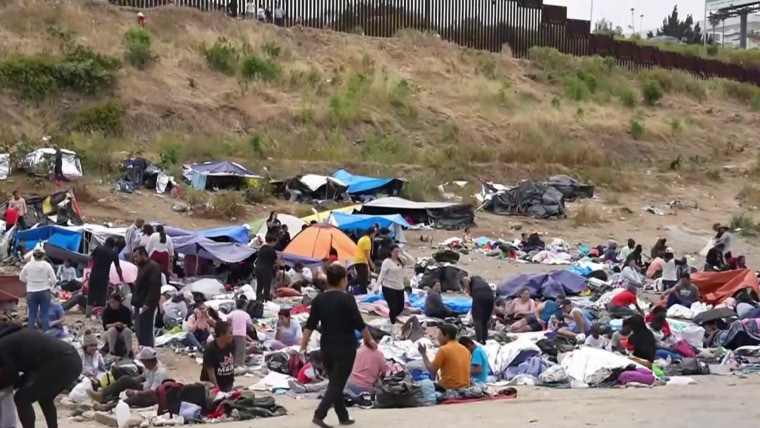[ad_1]
With the expiration of Title 42 looming, the Biden administration braced for the possibility of a migrant surge on the southern border. It decided to implement another way to send migrants back to Mexico without the chance to claim asylum — a new policy known as “asylum ineligibility.” If migrants have not tried to claim asylum in the countries they passed through on their way north or have not made appointments for U.S. asylum hearings through the government’s CBP One phone app, they are deemed ineligible to make asylum claims when they cross the border and are sent back south.
The Biden administration has defended using the policy in court, arguing that without it, the numbers could again rise to overwhelming levels. Two federal courts have ruled against the “asylum ineligibility” policy, and the Supreme Court it likely to decide its ultimate fate, but for now the administration is still using it to turn migrants back into Mexico.
So why are a lower percentage of migrants now being turned back?
The Department of Homeland Security did not respond to a request for comment on the decline in expulsions to Mexico.
One reason might be that it simply takes longer to process migrants under the new policy. Under Title 42, migrants did not need to be transferred or see asylum officers to determine whether they had the right to stay in the U.S. and seek legal protection. Now some people either remain in detention or are released into the U.S. while the Biden administration decides whether they are ineligible for asylum. While the new policy results in faster decisions than under the pre-2020 border rules, when many such decisions could take days, it is just not as fast as the expulsion process during the Title 42 era, when decisions could be made in minutes or hours.
The drop in expulsions may also be linked to the increased use of the CBP One app. Migrants en route to the U.S. have been able to make appointments for asylum hearings through the mobile app since January, but in recent months the number of users has climbed. In July, CBP One processed more than 44,700 people through appointments made on it, according to Customs and Border Protection data released last week. The majority of migrants who apply through the app are allowed to remain in the U.S. temporarily as they pursue their asylum claims — even though most of them will ultimately lose their cases.
Meanwhile, the number of attempted border crossings per day has crept back up from its post-Title 42 low of 4,000 per day to 8,000. And the number of people turned back, though still not at Title 42-era levels, is also rising.
Some shelter operators in Mexico say that while they saw an initial dip after Title 42, the number of migrants returning to their side of the border is starting to rise.
“The reality is that we have had more and more people who have been turned back,” said Francisco Bueno, the director of Casa del Migrante in Juárez, Mexico, just across from El Paso, Texas.
[ad_2]
Source link



